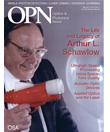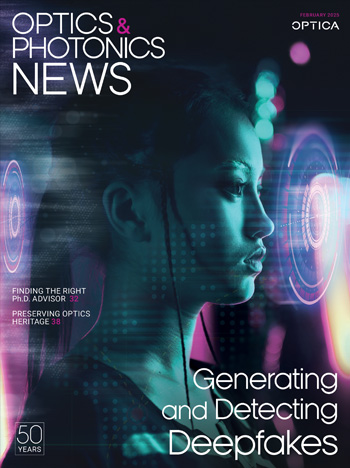Feature Articles
Credible (and Edible) Lasers: The Life of Arthur L. Schawlow
Arthur L. Schawlow was truly a one-of-a-kind scientist and human being. Known for his gentle spirit, his sense of humor and his scientific creativity, he was the only Nobel Prize winner to have served as an OSA president. OPN examines his life and legacy on the 90th anniversary of his birth.
by Patricia DaukantasUltrahigh-Speed Optical Processing Using Space-Time Duality
Temporal all-optical processing systems—which are based on the space-time duality of light—provide a practical approach for meeting the bandwidth demands of next-generation ultrahigh-speed technologies.
by Mark A. Foster, Reza Salem and Alexander L. GaetaIn-Fiber Acousto-Optic Devices for Laser Applications
These authors review in-fiber acousto-optic devices that have demonstrated new possibilities for the control of Q-switched distributed feedback and mode-locked all-fiber lasers—in other words, tools for using sound to control light.
by Christian Cuadrado-Laborde, Antonio Díez, Miguel V. Andrés, José L. Cruz and Miguel Bello-JiménezApplied Optics and the Early Days of the Laser
Prompted by the complaints of the so-called “Subversive Optics Society” in the late 1950s, OSA launched a new journal in 1962 to represent modern topics in optics. Due to fortuitous timing—and a highly competent managing editor—Applied Optics was able to cover the most current topic imaginable long before its competition: the laser.
by John N. HowardDepartments and Columns
Pop Culture Crimes against Lasers (and Other Optics)
With the laser into its 51st year of existence, filmmakers and TV producers have had a long time to master the fundamentals of lasers and other optical concepts. But optics unfortunately remains victim to the ever-tempting appeal of drama over reality.
Evolving CMOS Technology for High-Performance Single-Photon Detection
For decades, solid-state detectors could capture individual photons. This is now possible to do using avalanche photodiodes. So-called single-photon avalanche diodes (SPADs) are avalanche photodiodes biased above breakdown in Geiger mode and fabricated using CMOS processes.
Energetiq Technology Inc.: From Semi Fab to Bio Lab
This company takes a customer-first approach to creating and manufacturing efficient, high-brightness, laser-driven light sources—with applications in the semiconductor industry, analytical spectroscopy and the life sciences.
OPN Talks with James G. Fujimoto
Our conversation with James Fujimoto, OCT pioneer.
Using Satellite Maps to Aid Japan
In response to explosions at the Fukushima Nuclear Power Plant in the week after Japan’s 9.0-magnitude earthquake and tsunami on March 11, mapmakers at the Rochester Institute of Technology quickly made maps from satellite images to help emergency responders.
One Course, Two Top Optics Schools
The University of Arizona College of Optical Sciences and the Institute of Optics at the University of Rochester are going the distance this semester—by offering classes for credit from each other’s curricula.
OPN Talks with Donald Keck
Our conversation with Donald Keck, CLEO:2011 plenary session keynote speaker.
OPN Talks with Mordechai (Moti) Segev
Our conversation with Moti Segev, soliton specialist and CLEO:2011 fundamental science plenary speaker.
Stretchable Solar Cells
Researchers have developed organic solar cells that are not only flexible, but stretchable.
Imaging Drug Effects on Tumors
Holographic tissue dynamics spectroscopy allows researchers to look at motion inside living tissue.
OPN Talks with Susumu Noda
Our conversation with Susumu Noda, photonic crystal connoisseur and CLEO:2011 science & innovations speaker.
Growing Lasers on Silicon
A group at The University of California, Berkeley, described a method of creating gallium arsenide nanolasers monolithically integrated onto silicon.
ADVERTISEMENT
ADVERTISEMENT
Also in this Issue
Book Reviews
In Memory
Remembering Hendrik de Lang and Benedetto Daino.


![Illustration of a synapse in the brain. [Getty Images]](https://opnmedia.blob.core.windows.net/$web/opn/media/images/articles/2025/0425/departments/202504-cover-web.jpg?ext=.jpg)
![Fiber draped around a hand, demonstrating its flexibility. [Photo by Z. Wang and L. Wei]](https://opnmedia.blob.core.windows.net/$web/opn/media/images/articles/2025/0325/departments/202503-cover-web.jpg?ext=.jpg)
